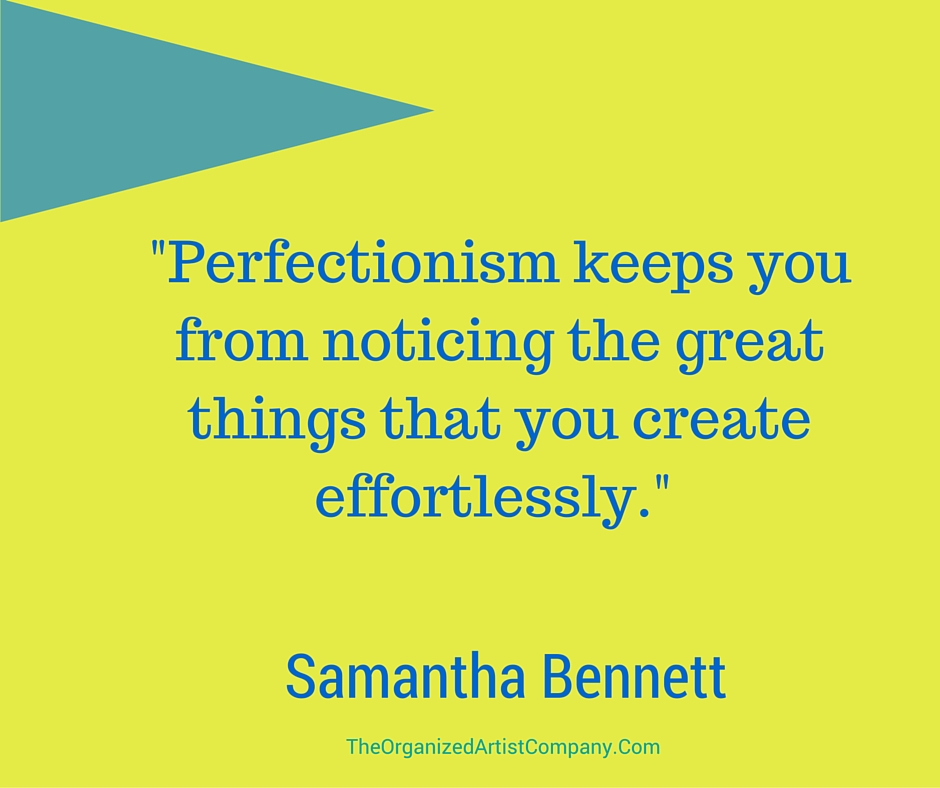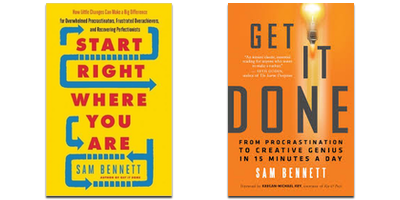
The Get It Done Workshop is like a delicious meal. It’s our nearly-legendary 8-week online course designed to get the creative person moving forward on their projects. We start next week.
Some examples of projects people have used The Get It Done Workshop to accomplish include:
– launched an online course
– finished book proposal
– started daily blogging
– cleared out clutter
– settled parent’s estate
– began painting again
– released a CD
But that’s the dinner.
And you want to know about the free dessert!
So here are the delectable bonuses that accompany The Get It Done Workshop —
- Instant access to the Procrastination Domination Starter Kit ($79 value) so you can get unstuck immediately.
“Inspiring, Doable, Engaging, Entertaining…It was very thorough!” – Anne
- A full year in The 365 Club ($120 value) which includes monthly open coaching calls with Sam plus daily inspirational emails plus about a grillion hours of exclusive recordings that you may listen/download anytime plus a very wonderful and supportive community on the private Facebook page.
“Sam beautifully supports the creative spirit. There are times she speaks a truth that you are not even aware exists inside you.” – Robin
- Two of my exclusive ebooks, “An Artist Talks to God,” and “Less Crazy, More Money: 52 Secrets to Running a Serene, Profitable Business.” ($40 value)
“Samantha’s program proved to me that we are all capable of greatness. I’m well on my way to creating a business plan for my feature film. I found my graphic artist and a website designer, and I have my first round investor list completed.” – Traci
- Free ticket to The Big Yes: How To Overcome Procrastination, Perfectionism and Self-Doubt and Make $10,000 (or More!) from Your Creativity event in Los Angeles in July — plus you can bring a friend for free! ($799 value) (you can discover more here: www.BigYesRevolution.com)
“I had an amazing time at The Big Yes! I loved Samantha’s stage presence: grounded, calm, real, funny, beautiful, brilliant, spacious, enlightening….I loved the structure: just the right amount of lecture, sharing, etc. to keep us alive and energized…I loved the food…I loved the venue–great hotel….I love how focused and energized, yet calm I feel now that I’m back home.” – Nancy
And there will be even more delicious treats — all for just $365 or three payments of $141 — and as usual, your satisfaction guaranteed or your tuition cheerfully refunded.
Go here to find out more and save your seat: www.MonsterGetItDone.com.
Here’s our curriculum (you know, the dinner : ) —
Session 1: Clarifying Your Goals
Session 2: Creating Your (Fun!) Personalized Project Plan
Session 3: BONUS Q&A Session
Session 4: Breaking Through Your Internal Barriers to Success
Session 5: Self-Promotion For Us Sensitive, Creative Types
Session 6: Teaching Our Shadows Grace
Session 7: The Beginning Of Wisdom
Session 8: BONUS Q&A Session
So if you’ve got something you’ve been procrastinating on, this is your super-wonderful-springtime-it-only-comes-once-a-year chance to Get It Done!

So here’s my little quiz:
I want you to think about one particular project you are procrastinating – you might have lots, but let’s just pick one – whichever one comes to the top of your head first.
OK? Got a project picked out?
Because we all know that some ideas take a looooooong time to come to fruition. And some plans are waiting for the right time, the right partner, the right technology….
So how to tell the difference between an idea that is still fomenting and an idea that we’re quashing?
Here’s your answer: INTUITION.
Here’s a 2-minute exercise on how to do that:
1) Get quiet inside of your mind, take a few deep breaths, and imagine your project sitting before you. What color is it? What form is it showing you?
2) Take its pulse. Is it vibrant and alive? Or does it feel strangled and weak?
3) Ask your project what it wants you to do. Listen to the answer without reacting. Just take in the information.
4) Say “thank you” to your project and come back to yourself. Make some notes.
If you’re still unsure, then try taking a few baby steps (less than 15 minutes; easily affordable; not too scary) toward your project and see what happens. If the universe comes rushing at you with bushels of support, then GREAT!
Proceed.
And if you make a few starts and it’s all knees-and-elbows and missed calls and weirdness, then drop it — now is not the right time for this project. Write it down and put it in the “Genius Ideas – Fomenting” file.
(You do have a file like that, yes? Or a shoebox? If not, you should get one. It’s important for every idea to have a home

Perfectionism is an insidious demon that must be fought with every weapon you’ve got.
Here’s what’s so tricky about perfectionism: it turns procrastination into a virtue.
Because it’s good to have high standards, right?
And it’s good to expect the best from your self, right?
We want to make things that are beautiful, extraordinary, unique…
And then you crumble under the pressure you’ve put on yourself and never create anything at all. But it’s not your fault – it’s your damn high standards.
The other problem with perfectionism is that it keeps you from noticing the great things that you create effortlessly.
By keeping your focus on that which is hard, unattainable or impossible to execute, you fail to give yourself credit for that which is easy and fun.
While you’re busy struggling with the idea that you need to be some great painter (all the while NOT painting), you might miss out on a brilliant career as a caricaturist. Your frustrated desire to write the perfect novel can prevent you from seeing your potential as a lyricist.
This is the worst kind of snobbery.
Disdaining your own gifts is as cruel as disdaining your own children.
Remember: The World Needs Your Art.
It’s the economy.
It’s your job.
It’s the boss.
It’s the Internet.
It’s him, her and them. (Especially THEM!)
You may be believing that the only reason you’re not moving forward on your project is because someone or something is in your way.
You’re pretty sure that you’d be just fine if it weren’t for those outside circumstances.
Or that person.
Or that group of people.
But here’s the problem: You can’t control them.
And they are NOT going to change.
Your job is not going to change.
That person is not going to change.
The condition of the world is not going to alter itself to suit you better.
So stop trying to control things you cannot control.
Let me say that again: STOP trying to control the things over which you have no control.
And quit giving those things so much space inside of your mind.
Just bless them, and, inasmuch as is possible, forget them.
Quit having imaginary arguments with them about how they should be treating you better.
Quit complaining. Entirely.
Instead, put as much of your focus as you can on the things you CAN control.
Namely: YOU.
You control how often you take a deep breath. You control the food you eat. You control the number of times you think loving, grateful thoughts.
You control the stories you tell yourself about you, your work and the world.
Shifting your focus from “out there” to “in here” will have an immediate and radical impact on your life. You will have reclaimed your power.
And here’s the wiggly bit — from that new position of power, you actually might be able to have an impact on the outside world.
My friend Jason has made a commitment to himself that every time he travels, he makes an effort to be the kindest person that anyone at that airport deals with that day. He considers it his personal mission to make traveling a gentler experience for himself and for everyone he meets. Pretty great, huh?
Simply by shifting his attention from the things he can’t control (TSA, delayed flights, crowded waiting areas, crying children) and paying strict attention to that which he can control (his attitude, his gratitude, his sense of humor, his breathing, his recognition of the Divine in everyone he meets) Jason manages to turn what can be a grueling experience into a blessing.
When you keep your focus “out there,” you are a victim.
When you keep your focus “in here,” you’re a transformational agent of change.
Little shift; big difference.
This little missive is #3 in a series of 7 that I’m doing to encourage you to Start Right Where You Are.
Start Right Where You Are is a lovely, live, 6-week teleclass that starts next Friday, Oct. 16th. It’s only $197 (payment plan available) and, as usual, “satisfaction guaranteed or your tuition cheerfully refunded.”
Here’s where you can go to find out more about it: www.StartRightWhereYouAre.com.
And here’s where you can watch the straight-from-the-heart preview event:
http://app.webinarjam.net/replay/608/7cfca59ac1/1/0
Which got these responses:
“awesome very helpful answer – so joyfully actionable. I’m on it!” – K.
“totally laughing out loud” – C.
“Yep! I even snorted” – T
“love that reframing – actually brought tears for honoring and being authentic..” – K.
“very emotional…. thank you Sam” – S.
When was the last time a webinar made you laugh AND cry?!!?
Plus there’s a special offer that’s only good for the first 50 people who take advantage of it, so listen SOON, OK?
So just to recap, here are your opportunities:
1) Spend 15 minutes right now working on a project that is dear to your heart.
2) Watch the “Procrastination & Desire” video here:http://app.webinarjam.net/replay/608/7cfca59ac1/1/0
3) Check out Start Right Where You Are at www.StartRightWhereYouAre.com and see if it feels like a good fit for you.
And please write me back and let me know how it goes for you, OK?
Remember: The World Needs Your Art.
“My teacher told me I had no talent.”
“My partner isn’t very supportive.”
“I’ve failed before…”
One of the reasons you aren’t moving forward on your projects is because you got your heart broken.
You’ve gotten bad reviews, lost money, chosen bad partners, been scorned, laughed at, put down, fired, misunderstood, tricked and rejected.
And that old pain still hurts.
But guess what?
We ALL have experienced that pain.
Moving past the pain is what turns you into a great artist, because it forces you to learn about fragility, about limitations, about foolishness, ambition and trust.
Once you release the idea that you (alone) have been victimized, you can start to dive into the infinite subtleties of human dynamics.
You can start to realize that everyone in your life genuinely thought they were doing the right thing. They honestly believed that they were helping you, protecting you, teaching you something important.
No matter how misguided, they were doing the best they could with the information they had at the time.
Just as you were.
And are, still.
Your creative life is not supposed to be an endless hopscotching from one lily pad of success to another, any more than every romance is supposed to end in happily-ever-after.
Being a creative genius is about falling down 8 times and getting up 9.
Or, more accurately, falling down 8000 times and getting up 8001.
Every single person – and certainly every single artist – can tell you toe-curling stories about their agonizing failures and impossible obstacles.
So…it’s not just you.
I know your heartbreak has been painful for you, but it’s no reason to stop working.
In fact, the first thing I would recommend is for you to make some art about that heartbreak.
Make a story/song/dance/picture about that humiliated student, that wounded daughter, that neglected performer, that bad review, that unwise bargain.
And then…perhaps you can spend 15 minutes on your project.
“It’s supposed to be hard. If it wasn’t hard, everyone would do it. The hard is what makes it great.” – Tom Hanks as Jimmy Duggan in A League of Their Own, screenplay by the great Lowell Ganz and Babaloo Mandel
This little missive is #2 in a series of 7 that I’m doing to encourage you to Start Right Where You Are.
Start Right Where You Are is a lovely, live, 6-week teleclass that starts next Friday, Oct. 16th. It’s only $197 (payment plan available) and, as usual, “satisfaction guaranteed or your tuition cheerfully refunded.”
Here’s where you can go to find out more about it: www.StartRightWhereYouAre.com.
And here’s where you can watch the straight-from-the-heart preview event:
http://app.webinarjam.net/replay/608/7cfca59ac1/1/0
Which got these responses:
“awesome very helpful answer – so joyfully actionable. I’m on it!” – K.
“totally laughing out loud” – C.
“Yep! I even snorted” – T
“love that reframing – actually brought tears for honoring and being authentic..” – K.
“very emotional…. thank you Sam” – S.
When was the last time a webinar made you laugh AND cry?!!?
Plus there’s a special offer that’s only good for the first 50 people who take advantage of it, so listen SOON, OK?
So just to recap, here are your opportunities:
1) Spend 15 minutes right now making some art about one time when you got your creative heart broken.
2) Watch the “Procrastination & Desire” video here:http://app.webinarjam.net/replay/608/7cfca59ac1/1/0
3) Check out Start Right Where You Are at www.StartRightWhereYouAre.com and see if it feels like a good fit for you.
And please write me back and let me know how it goes for you, OK?
Remember: The World Needs Your Art.
“I’m so busy…I just don’t have the time.”
“Now is not the right time…maybe later.”
“I’m not ready yet.”
You know your projects are important to you…but you just can’t seem to find the time to work on them.
Or maybe you feel like there will be some time in the future….once the kids are in school, or once you lose 10 pounds, or maybe after the holidays….
Or you honestly believe that you are not yet ready to begin. You need another certification, or maybe a training, or you just need to feel more ready.
I hear this all the time.
And in all love, I gotta say: BALONEY.
You DO have the time. You’re just spending it on something else.
And I guarantee there is no time in the future when it will be more “convenient” or a “better” time to begin.
And you are ready.
Believe me, the fact that you have had the idea tells me that you’re ready. If you weren’t ready, you never would have thought of it.
Look, we all get the same 24 hours.
Nobody gets more and nobody gets less.
And I know you have real demands on your time…the job, the kids, the spouse, the parents, the community….but I bet you can find 15 minutes, right?
So do that.
Commit to that right now.
Put your hand on your heart and say this pledge:
“I promise that I will spend 15 minutes every single day, 365 days a year, on my project, starting right now.”
And then set your timer or the alarm on your phone and do it.
Even if you just stare at a blank piece of paper for 15 minutes – that’s great!
Or maybe you want to meditate or pray or breathe or stretch or dance or play with polymer clay or embroider a flower on a scrap of fabric or compose a few bars or write just ONE SENTENCE of your memoir….
Whatever the project is that you know would make a difference in your life, spend 15 minutes on it right now.
And then do that again tomorrow.
And the next day.
And then – and this one might be hard because somehow doing more than 3 in row of anything can be a little challenging – you’ll want to do it again. And maybe give your a little reward (like a nice walk around the block or a phone call with an old friend or a nice swim….) just for being so good and brave.
This little missive in one is a series of 7 that I’m doing to encourage you to Start Right Where You Are.
Start Right Where You Are is a lovely, live, 6-week teleclass that starts next Friday, Oct. 16th. It’s only $197 (payment plan available) and “satisfaction guaranteed or your tuition cheerfully refunded.”
Here’s where you can go to find out more about it: www.StartRightWhereYouAre.com.
And here’s where you can watch the straight-from-the-heart preview event:
http://app.webinarjam.net/replay/608/7cfca59ac1/1/0
Which got these responses:
“awesome very helpful answer – so joyfully actionable. I’m on it!” – K.
“totally laughing out loud” – C.
“Yep! I even snorted” – T
“love that reframing – actually brought tears for honoring and being authentic..” – K.
“very emotional…. thank you Sam” – S.
When was the last time a webinar made you laugh AND cry?!!?
Plus there’s a special offer that’s only good for the first 50 people who take advantage of it, so listen SOON, OK?
So just to recap, here are your opportunities:
1) Spend 15 minutes right now on a project that means something to you.
2) Watch the “Procrastination & Desire” video here:
http://app.webinarjam.net/replay/608/7cfca59ac1/1/0
3) Check out Start Right Where You Are at www.StartRightWhereYouAre.com and see if it feels like a good fit for you.
And please write me back and let me know how it goes for you, OK?
Remember: The World Needs Your Art.




